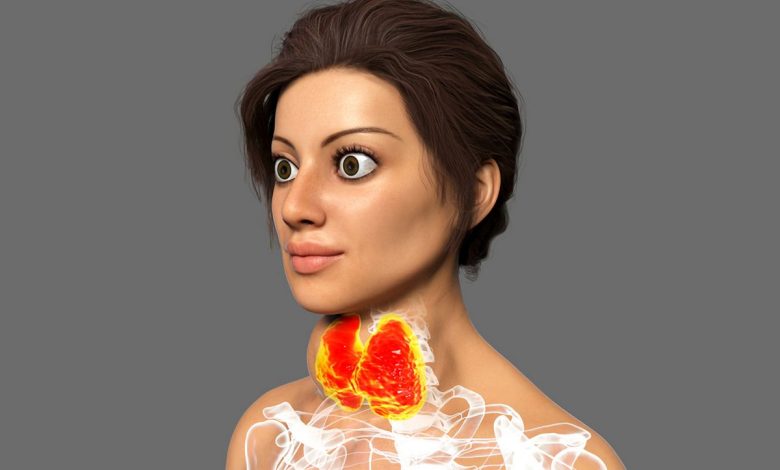bulging eyes, exophthalmos: what is this, causes, symptoms, diagnostics, treatment, prevention

Eyes – bulging; Protruding eyes; Exophthalmos; Proptosis; Bulging eyes
Exophthalmos is a medical term, used to describe a state, in which the eye appears to bulge out of the socket. This condition is also known as proptosis.. It can cause discomfort, aesthetic issues and, in severe cases, vision loss. Exophthalmos is often a symptom of an underlying disorder and can range from mild to severe.
Causes of exophthalmos
There are several major diseases, which can cause exophthalmos, including:
- Thyroid disease: it's an autoimmune disease, affecting muscles and adipose tissue, surrounding the eye.
- orbital tumor: tumor, which is formed inside the eye socket, causing protrusion of the eye.
- orbital cellulitis: it is an infection of the soft tissues of the eye socket, which can cause inflammation and swelling.
- Trauma: Trauma to the eye or surrounding area can cause exophthalmos, especially if there is a fracture of the wall of the orbit.
- Graves' disease: it's an autoimmune disease, which affects the thyroid gland and can cause exophthalmos.
Symptoms of exophthalmos
The most common symptom of exophthalmos is a noticeable protrusion of one or both eyes.. Other symptoms may include:
- Pain or discomfort in the eye or surrounding area
- Redness or swelling of the eye
- Double vision or decreased vision
- Feeling of pressure behind the eye
- drooping eyelid
When to contact a healthcare professional
If any of the above symptoms appear, it is important to seek medical attention. In severe cases, timely treatment can prevent vision loss and other serious complications..
Questions, that your doctor may ask
Your doctor will ask you a series of questions, to help diagnose the underlying cause of your exophthalmos. Some of the questions, which the doctor may ask, include:
- When did you first notice the bulging eye??
- Have you experienced any pain or discomfort in or around the eye?
- Have you noticed any changes in your vision?
- Have you had a recent head or eye injury?
- Have you had a history of autoimmune diseases or other diseases, affecting the eyes or thyroid?
Diagnosis of exophthalmos
Your doctor will perform a comprehensive eye examination, including visual acuity test and slit lamp examination. It can also perform visualization tests, such as MRI or computed tomography, to help diagnose the underlying cause of exophthalmos.
Treatment of exophthalmos
Treatment for exophthalmos will depend on the underlying cause..
In some cases, medications may be prescribed to treat the underlying condition., such as antibiotics for orbital cellulitis or thyroid hormone replacement therapy for Graves' disease.
In severe cases, surgery may be required to remove the tumor or repair the fracture..
Home treatment for bulging eyes
If you have been diagnosed with exophthalmos, you can take a few steps at home, to manage symptoms:
- Apply a cold compress to the affected eye, to reduce swelling and discomfort.
- Avoid eye strain, taking frequent breaks from reading or computer work.
- Avoid rubbing or touching the affected eye, as this can further irritate the eyes and worsen symptoms.
- Eat a healthy diet and get more rest, to improve overall eye health.
Prevention of exophthalmos
In some cases exophthalmos cannot be prevented, because it is often a symptom of an underlying disease. Nonetheless, there are several steps, you can take, to maintain eye health and reduce the risk of exophthalmos:
- Follow a healthy diet. Dieting, rich in fruits and vegetables, lean protein and healthy fats, may help maintain good eye health and reduce the risk of developing eye diseases.
- Protect your eyes from the sun: wearing sunglasses and a hat, when you are outside, may help protect your eyes from harmful UV rays and reduce your risk of eye disease.
- Observe the rules of hygiene: washing your hands frequently and avoiding touching your face can help reduce your risk of infections, which can irritate the eyes.
- See your doctor regularly: regular check-ups with a doctor can help detect any eye disease at an early stage and ensure timely treatment.
Conclusion
Exophthalmos is a condition, in which the eye appears to bulge out of the socket. This may be a symptom of an underlying condition and can range from mild to severe..
Treatment for exophthalmos will depend on the underlying cause and may include medication., surgical or home treatment.
Maintaining good eye health and seeing your doctor regularly can help reduce your risk of exophthalmos..
Used sources and literature
Cioffi GA, Liebmann JM. Diseases of the visual system. In: Goldman L, Schafer AI, eds. Goldman-Cecil Medicine. 26th ed. Philadelphia, PA: Elsevier; 2020:chap 395.
McNab AA. Proptosis at different ages. In: Lambert SR, CJ Lyons, eds. Taylor and Hoyt’s Pediatric Ophthalmology and Strabismus. 5th ed. Philadelphia, PA: Elsevier; 2017:chap 96.
Olson J. Medical ophthalmology. In: Ralston SH, Penman ID, Strachan MWJ, Hobson RP, eds. Davidson’s Principles and Practice of Medicine. 23rd ed. Philadelphia, PA: Elsevier; 2018:chap 27.
